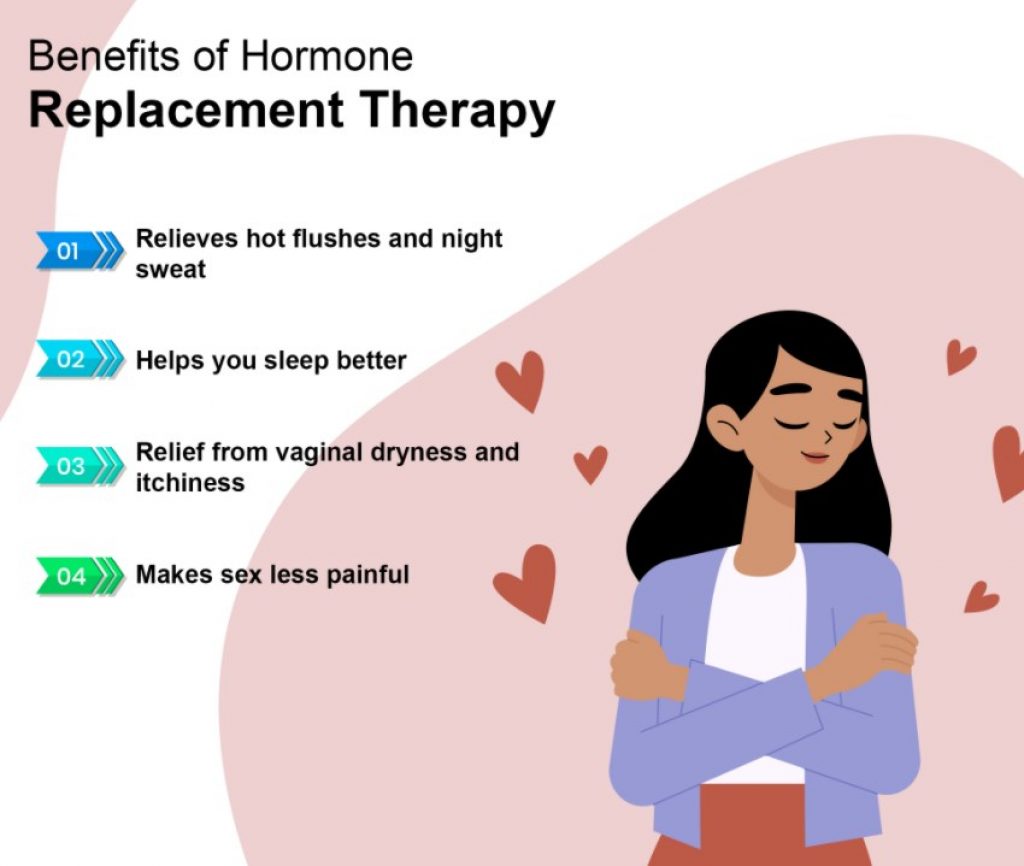
Hormone replacement is a treatment that aims to replace the hormones responsible for the symptoms that herald the onset of menopause, among other endocrine disorders. The hormone works by replacing female hormones such as estrogen and significantly reduces any discomfort they may experience from the symptoms of menopause.
However, the term may refer to the general replacement of a deficiency in your hormone levels and encompasses other treatments such as insulin and human growth hormone therapies.
Whether you are looking to manage your menopausal symptoms or give yourself a growth boost, it is advisable that you only seek hormone replacement therapy (HRT) when you have a deficiency of the hormone you need to replace. Note that a test of the blood hormone levels is necessary; you will need to involve your doctor if you intend to start HRT as only they can prescribe it.
There are various ways to administer replacement hormones, most of which the contingent on personal preferences. Available routes of administration include:
- Tablets
- Skin patches
- Intradermal or subdermal implants
- Subcutaneous injections
- Intramuscular injections
- Historical Facts About HRT
The use and effectiveness of HRT is a subject of controversy. There are many important milestones in developing the approach that contributes to the debate, some of which we highlight here.
In the 1920s, studies to investigate and isolate female hormones were successfully done in St. Louis, Missouri, by Edward Doisy, a biochemist. By 1942 there was the introduction of the first synthetic hormone to manage hot flushes in menopause.
In 1966, Author Robert Wilson published ‘Feminine Forever,’ a book that claims that hormone therapy significantly improves women’s quality of life. By 2002, a therapeutic combination of progesterone and estrogen was found to increase breast cancer risk, leading to many patients dropping it.
These are results from a long-term study by the Women’s Health Initiative of the National Institute of Health. From the late 2000s to the present times, more practical hormone therapy combinations have reduced HRT use fears.
Table of Contents
Indications for Hormonal Replacement

img sourrce: gabi-journal.net
Menopause is by far the most common and initial indication for HRT in women. In menopause, women can use HRT to manage menopause symptoms such as hot flushes, reduced libido, weight gain, and fatigue.
Alternatively, women who are just beginning menopause can use HRT until menopause sets in fully. In some cases, where women face the risk of osteoporosis, HRT can be a treatment alternative. Other indications that necessitate hormone replacement include:
- Insulin resistance
- Disorders of the thyroid and adrenal glands
- Growth retardation
- Types of Available Hormone Replacement Therapies
Hormone replacement therapy comes in many forms, essentially the replacement or addition of hormones in the body to correct deficiencies of the same. For these hormones to be considered, they have to be similar to the original variants; therefore known as bioidentical hormones. Examples of hormones that are replaceable include:
- Estrogen
- Progesterone
- Testosterone
- Human growth hormone
- Insulin
- Bio-identical Hormones and Results They Bring to Patients
According to hghtherapydoc.com of Miami bio-identical hormones are virtually similar to the hormones that the body produces in all ways, with the difference being that they are synthetic for the most part. The implication of their similarity means that they are neither more harmful nor less active than natural hormones. The bio-identical hormones have the FDA’s approval for many products, and once they go through compounding, you can find them in many drugs.
Whether you want to manage your insulin deficiency, use human growth hormone (HGH) to boost tissue repair, or estrogen to manage your menopausal onset, bio-identical hormones have many results, some of which include:
- Relief in signs of menopause
- Improvement in sex drive
- Management of blood glucose levels
Dangers of Scams and Illegal Prescription

img source: iiflinsurance.com
It would be best if you chose a qualified specialist to treat and prescribe injections. Also, the condition you want to treat must be legal. For instance, cancer patients are discouraged from this treatment.
Illegal prescriptions are hazardous. You are likely to experience the following side effects:
- Type 2 diabetes.
- Chronic pain
- You risk developing cancerous tumors.
- Numbness
- High levels of cholesterol.
- You develop carpal tunnel syndrome.
- Enlargement of the breast tissues.
- Your legs and arms are likely to swell.
From the above, you can tell why you need the right prescription from a high-qualified doctor. There are many risks involved, and you are likely to incur a lot of money. Avoid using growth hormone for illegal conditions.
HGH and Results

img source: dnaindia.com
Human growth hormone has many uses, such as treatment of delayed development in children and muscle atrophy treatment. The impairment of growth has many causes, most of them stemming from infancy. Some of the common reasons for growth impairment are:
- A deficiency of the human growth hormone
- Congenital disorders such as Turner and Prader-Willi syndromes
- Preterm babies
- Malignancies that interfere with HGH production, such as those that affect the pituitary
- Kidney failure
When you get the HGH treatment, some noticeable changes take place, albeit the best taking longer. The outcomes relate to overall growth in strength and include increment in muscle mass and exercise capacity. Additionally, you could experience a reduction in body fat and enhancement of bone compactness.
The Benefits of HRT

img source: ezcareclinic.com
HRT is relatively safe, and taking it will most certainly increase your degree of comfort and quality of life in general once you start getting it. This therapy will solve most of your problems if you have any adverse symptoms in the blood pressure regulation or urogenital systems.
It is also great to know that HRT can lower the risk of getting some conditions later in life, such as osteoporosis, colorectal cancer, diseases of the cardiovascular system, and degenerative mental diseases.
Ways to Improve HRT Achievements
HRT is an optional therapy, and choosing and staying with it makes all the difference. If you seek the best out HRT, you have to start by selecting a comfortable delivery method. Routine doctor visits ensure that you get the best results out of your replacement therapy. Research on what it is capable of is still ongoing; therefore, you need to stay abreast of the possibilities that may arise from the same.
There is some concern that HRT may predispose you to some types of cancers. However, this should not give you any cause for concern as long as you live healthily and minimize the risk factors that precede cancer. Have regular conversations with your doctor on the best way forward if you are hesitant, and ensure that you both try to keep up with ongoing research.







